Showing 1–12 of 27 results
-
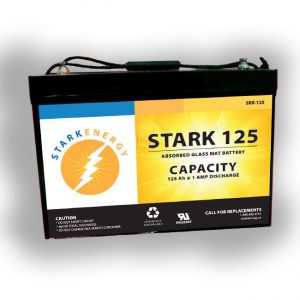
Stark AGM Battery, 12V, 125 AHr
$371.00 -
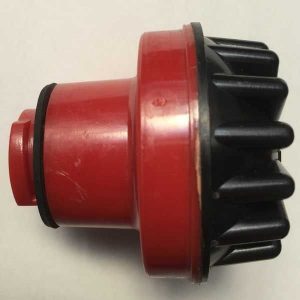
Catalytic Recombinant Cap for Surrettes
$24.00 -
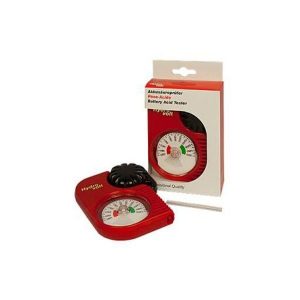
MN-HYDROMETER
$78.00 -
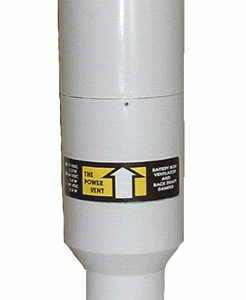
48V Power Vent
$210.00 -
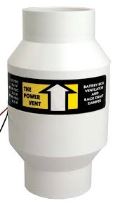
24V Power Vent
$167.00 -
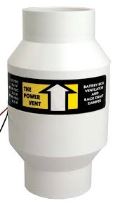
12V Power Vent
$167.00 -

Solar Series Water Saving Vents for 6V & 2V Batteries
$9.00 -
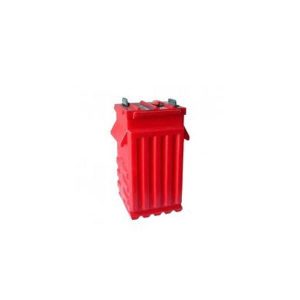
Surrette Solar Battery, 2V, 3426 AHr, Dual Wall Container
$1,938.00 -
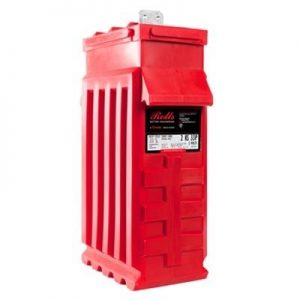
Surrette Solar Battery, 2V, 2491 AHr, Dual Wall Container
$1,308.00 -
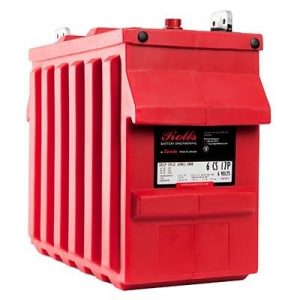
Surrette Solar Battery, 6V, 1156 AHr, Dual Wall Container
$2,016.00 -
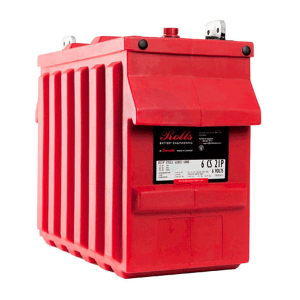
Surrette Solar Battery, 6V, 963 AHr, Dual Wall Container
$1,737.00 -
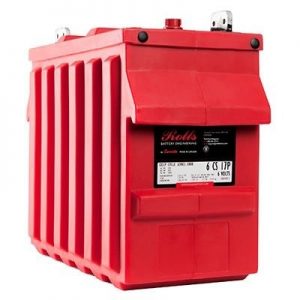
Surrette Solar Battery, 6V, 770 AHr, Dual Wall Container
$1,424.00
Batteries
Throughout the day, your solar panels in Canada generate electricity by absorbing sunlight. But what will happen at night after the sun sets, or if you run out of power on cloudy days? In these situations, you’ll need a battery to sustain your energy needs.
However, choosing the best battery for your solar array is not always a straightforward decision. We’ve created this resource about solar batteries to help you determine the right amount of voltage, amp hours, and the type of battery that you’ll need. We carry batteries from Kisae, Midnite Solar, Rolls,SimpliPhi, and Stark.
When Do You Need a Solar Battery?
While it’s possible to run a solar system without a battery, this approach has its limitations. If these situations apply to you, you could benefit from a solar battery:
- Your PV panels don’t produce enough electricity during the day. If you run out of electricity on a cloudy day, it’s a major inconvenience. Solar batteries store power that can be used during times like these.
- You don’t want to lose power during outages. Solar panels that are connected to the grid will shut down automatically if power lines are damaged. This is done to prevent safety hazards for utility workers who need to fix issues with the grid. Even if the sun is shining, you won’t be able to use electricity—unless you have a battery to store power.
- You want to lower your electricity bill. If you run out of solar power at night, you might be forced to draw electricity from the grid. Despite setting up solar panels, you might still end up paying for some electricity. Eliminate this potential cost with a battery that stores surplus power for when you need it.
- You need more electricity during peak usage hours. For most people, their solar systems generate the most energy when they use it the least. In the morning, you may only need electricity to power your coffee maker and charge your phone; in the evening, you want to run your computer, TV, and more. With a battery, you can store the power that your PV panels generate during the day and use it at a later time.
Types of Batteries
Which battery is right for your solar system? Here’s a bit more information about the most common kinds of batteries to help you decide:
Flooded Batteries
Wet cell batteries are a type of lead acid battery. They’re both affordable and a good fit for medium or large-scale solar setups. One downside to flooded batteries is that they require maintenance, such as adding distilled water, cleaning, and equalizing. Failing to add water will cause the batteries to corrode.
These batteries are suitable for many solar arrays, but they will require maintenance to function properly.
AGM Batteries
Absorbent Glass Mat batteries are made to endure the harsh winters that Canada is known for, and can function even at -40°C!
These lead acid batteries are more affordable than lithium ones. The absorbent glass mat absorbs sulfuric acid and holds electrolytes in place, which prevents any spills or leaks from the battery. AGM batteries have a shorter charging time than flooded batteries, and you won’t need to perform any maintenance either.
This battery has a low internal resistance, which determines its ability to supply power on demand. As a result, AGM batteries have a shorter charging time and higher voltage output than other types of lead acid batteries.
Lithium Batteries
If you’re looking for a premium battery that will power your solar system for years to come, a lithium battery is a great option. These batteries are used to power cellphones, laptops, and cameras.
A few main advantages of lithium batteries are their improved cycle life (a term that refers to how many times the battery can be charged/discharged until its performance is diminished), maintenance-free operation, and efficient charging. Lithium batteries don’t contain sulfuric acid or corrosive lead. They’re also lightweight, which makes them easier to store.
Given all these features, lithium batteries are the most expensive of all. They’re still a cost-effective choice because they last longer than other batteries.
How Much Voltage and Amp Hours Does Your Battery Need?
When you’re shopping for a battery, there are a few important terms to understand. They will help you purchase a battery that has enough capacity for your system.
Amp Hours (AHr)
This measure tells you the amount of amperage that your battery can supply in one hour. For example, a 125 AHr battery can continuously supply 125 amps for 60 minutes. After that, the battery will be drained. Keep in mind that in a real application, the AHr tends to fluctuate due to varying temperatures and vibration.
The higher the AHr of a battery is, the more charge it can hold. Without enough amp hours, your battery will lack the capacity to power your home.
Voltage (V)
With more voltage, more current flows from your battery to your electronics and appliances. High voltage is like increasing the water pressure in a hose; you’ll need it to power appliances that demand more energy.
The amount of voltage you need for your home and/or business depends on how much power you use. For most residences, 12V will suffice; for large-scale setups, you may need 24V or 48V.
If you have an inverter, try to match the voltage of your battery to that of your inverter.
Do I Need a Solar Battery Charger?
Looking for a portable battery that you can use to charge electronics?
A solar battery charger is great for maintaining the charge on devices like your cellphone, laptop, or RV battery.
These devices are convenient, eco-friendly, and affordable. Take them with you on your next road or camping trip and you won’t need to worry about your phone or car battery dying.
Are you looking to increase the reliability and storage capacity of your solar array? If so, a solar battery may be right for you. Before you buy, be sure to identify the specifications that you require, such as the battery type and the voltage.
